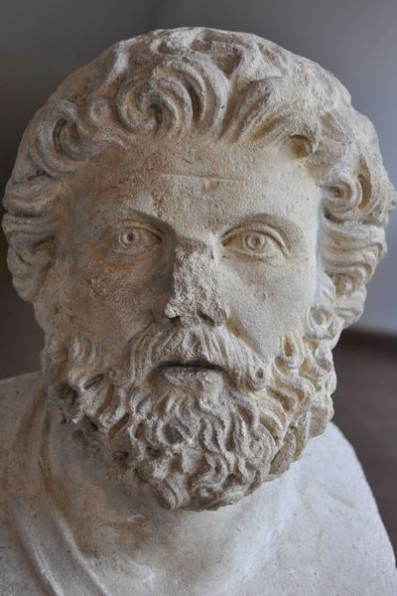Attalus
Attalus (ca.390-336): courtier of the Macedonian king Philip II.

History has been unkind to Attalus, just because of one single unhappy stupidity. Being drunk during a banquet, he spoke words that were understood as an insult to the Macedonian crown prince Alexander, who ordered his execution once he had become king. Alexander's version of the incident has become canonized, and many anecdotes about Attalus are therefore hostile. Yet, he was clearly an important man, and we would love to know more.
Unfortunately, we do not even know how he rose to prominence. As he was one of the two commanders of a large Macedonian army in 336, he was clearly a capable officer, which explains a lot, but perhaps not enough. However this may be, it is certain that in 337, he was important enough to be considered worthy of a marriage that would relate him to the royal family: his niece and ward Cleopatra married to king Philip II of Macedonia.
During the wedding banquet, he prayed (according to Plutarch of Chaeronea) that Cleopatra might produce a legitimate son and heir to the Macedonian throne. Crown prince Alexander felt insulted and disturbed the prayer with his shouts; his father Philip wanted to punish his son, but was too drunk to reach him. After this, Alexander and his mother Olympias left the Macedonian court and found asylum in Epirus, where Olympias' brother Alexander of Molossis was king. This was the beginning of a major diplomatic crisis.
If Attalus really said this, that would be very stupid indeed, but we cannot be certain. The story is told from Alexander's point of view, and may be exaggerated. Anyhow, whatever happened, the crown prince never forgave the uncle of his father's bride.
Philip himself seems to have been less angry with Attalus. Early in 336, he appointed him and Parmenion as commanders of the advance force that would invade Asia, to wage war against the Achaemenid Empire, which was unquiet after the accession of Artaxerxes IV Arses. Now that Attalus was away, Philip could reconcile himself to his son.
The army of Attalus and Parmenion had already reached Magnesia, near Sardes, when they met an army of Greek mercenaries in Persian service, commanded by Memnon of Rhodes. For the first time in several years, a Greek army defeated the Macedonians. Worse was to come. When Parmenion and Attalus led back their army, news arrived that Philip had been assassinated and Alexander had become king (October 336). The new ruler hated Attalus, and Parmenion did what he was expected to do: Attalus was murdered.
Reports that Attalus was planning rebellion against Alexander are probably nothing more than Macedonian propaganda, intended to justify the killing.
The dead man was immediately connected with the murder of Philip. The assassin, Pausanias, had been sexually abused by muleteers of Attalus, and Philip had refused to punish Attalus (text). It is unclear whether there is any truth in this accusation.